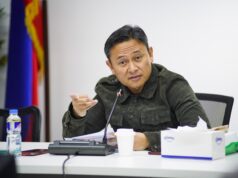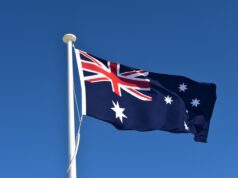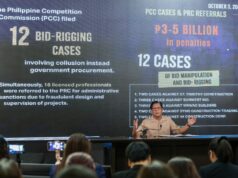26 killed in Manila as drug war geared up
AT LEAST 26 people died overnight in police operations in the Philippine capital of Manila, police said on Thursday, a second night of heavy bloodshed this week in an intensification of President Rodrigo R. Duterte’s fierce war on drugs and crime.
The killings across Manila followed 32 deaths in near-simultaneous police raids on Monday night in Bulacan province, which borders the capital.
Together, they mark the deadliest period of a drugs-focused crackdown that has killed thousands of Filipinos, and caused international alarm, since Mr. Duterte took office over a year ago.
Col. Erwin Margarejo, spokesman for the Manila police, described the raids that started late Wednesday in Manila as “one-time, big-time” operations, the same term used by police in Bulacan who said the victims died because they put up a fight.
“This is ‘one-time, big-time’ operations, so it is not focused only on drugs, we are operating also against other street crimes, like robbery, but these people could also be under the influence of drugs,” Mr. Margarejo said. “If they resisted violently, our police have to defend themselves.”
Mr. Duterte unleashed his crackdown the day he took office on June 30 last year after a convincing win in an election in which he campaigned heavily on a promise to use deadly force to wipe out crime and drugs.
It was not immediately clear what was behind the step-up in the number of coordinated police operations this week, but Mr. Duterte gave a clear indication on Wednesday that it had his blessing.
He said it was good that 32 criminals had been killed in Bulacan, then added: “Let’s kill another 32 every day. Maybe we can reduce what ails this country.”
MYSTERIOUS MURDERS
Mr. Duterte also chided human rights groups for getting in the way of his anti-drugs campaign and said police should shoot them if they obstructed justice, a remark the New York-based Human Rights Watch said puts activists “in grave danger.”
Its deputy Asia director, Phelim Kine, described the comments as “like painting a target on the backs of courageous people working to protect the rights and upholding the dignity of all Filipinos.”
The exact number of people killed during the war on drugs is difficult to quantify, with no independent statistics available and police providing comprehensive data only for deaths during anti-drugs operations, where official accounts typically say suspects resisted arrest.
From the start of the drugs war to the end of July, police said over 3,400 people were killed in their operations. Police said about 2,100 deaths among some 13,500 murders over the same period were drugs-related, attributed to turf wars, informants being silenced, or vigilantes killing drug users.
A total of 65 policemen have been killed on the job in this time. Critics maintain that members of the Philippine National Police (PNP) are executing suspects and say it is likely they have a hand in thousands of unsolved murders of drug users by mysterious vigilantes. The PNP and government reject that.
Although the violence has been criticized by much of the international community, Filipinos largely support the campaign and domestic opposition to it has been muted.
Several Senate hearings into allegations that Mr. Duterte operated a death squad when he was a city mayor and was now using the same approach on a national scale have been inconclusive, while an impeachment complaint filed earlier this year was dismissed by Congress.
Meanwhile, his spokesman said of the Bulacan operations there will be “a fair and impartial investigation.”
“The Bulacan raids, we have to underscore, are not the result of a single action, but a wide-ranging simultaneous police operations against illegal drug offenders conducted in the whole province of Bulacan. Local authorities were met with violent resistance as evidenced by the recovery of firearms, grenades and live ammunitions,” Presidential Spokesperson Ernesto C. Abella also said.
PHL ‘NOW NARCO-STATE’
Speaking to cops in a Mindanao city where a mayor allegedly involved in the narcotics trade was killed in a deadly raid, Mr. Duterte on Thursday said the country is now a narcotics state despite the violence in the course of his drug war.
“Now, mag-tanong kayo (If you would ask), ang Pilipinas, are we or are we not a narcotic country? Yes, we are,” Mr. Duterte told cops stationed in Ozamiz City, contrary to his previous warnings that the Philippines is “on the brink” of becoming a narco-state.
The firebrand leader said the critics of his drug war were right for criticizing his six-month deadline in eradicating the narcotics trade, adding that he was not aware of the depth of the nation’s drug problem until he became president.
He then explained that his anti-drug campaign in Davao City, where he was mayor for more than two decades, was his “template” when he took the bloody crackdown on a national level.
“Eh Davao, makita naman. Nakapunta na kayo lahat doon. May droga. Pero sabi ko sa’yo, maglaro ka doon patay ka talaga,” he said.
(If you’ve been to Davao, yes, there were drugs there. But I tell you, if you play with drugs there, you will be killed.)
Mr. Duterte earlier admitted that it was a “miscalculation” on his part when he promised during the election campaign to end the drug scourge in three to six months.
Just recently, he said the Philippines cannot control the narcotics trade and that the problem would not be solved by a chief executive in just one term.
In the same speech in Ozamiz, Mr. Duterte, after showing his thick list of suspected drug personalities, assured the police force that while narco-politics in the city would “stay for a while,” he would free the country from illegal drugs before his term ends.
He added, apparently in jest, that there was no need for him to shoot all the people in his drug list when he could just ship them to the South Pole and drown them there.
“Dahan dahanin ko lang naman sila (I will slowly kill them),” he said.
Reynaldo O. Parojinog, Sr., mayor of Ozamiz City whose name was among those in Mr. Duterte’s drug list, was shot dead at his home last month along with his wife, his brother and nine others in a dawn raid, police said.
Following the raid, police arrested Mr. Parojinog’s daughter, Nova Princess Parojinog-Echavez, the city’s vice-mayor, and said she would face charges. Several others were also arrested.
Mr. Duterte had offered a P2-million reward for each policeman caught and proven to be involved in the burying of bodies in a compound in Ozamiz City that was allegedly used as dumping ground for the remains of rivals of the Parojinog family in the narcotics business. — Reuters, with Ian Nicolas P. Cigaral



